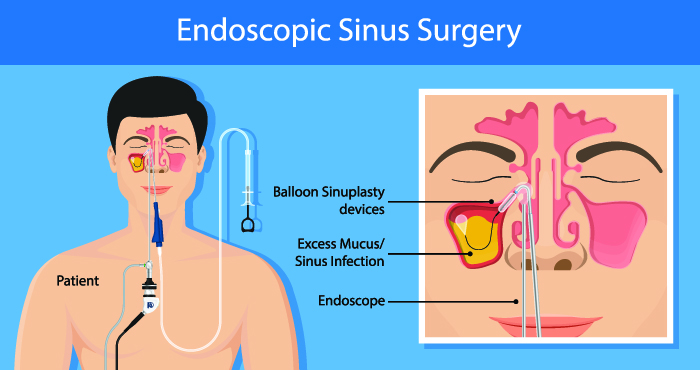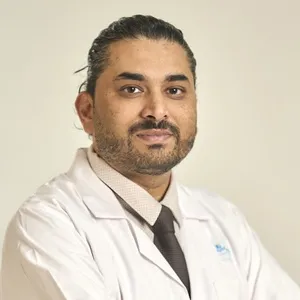Endoscopic sinus surgery Treatment & Diagnostics in Sadashiv Peth, Pune
Endoscopic sinus surgery
Endoscopic sinus surgery is a surgical procedure where an endoscope is inserted into the sinuses so that the doctor can see better. Other instruments like curette, burr, or lasers may also be inserted to remove the blockage. This surgery is primarily done because of chronic sinusitis which does not go away through medication.
What is endoscopic sinus surgery?
It is a surgical procedure that is done for the removal of any obstruction or blockages in the sinus. This is common in chronic sinusitis, growths or polyps blocking the sinus openings. This surgical procedure is relatively simple and minimally invasive. It provides immediate relief in sinusitis and helps to drain the sinus easily.
Endoscopic sinus surgery is different from regular sinus surgery as it does not require a separate incision. It also treats the underlying problem by allowing access to sinuses that may be blocked.

Who should get an endoscopic sinus surgery?
This surgery is done for those with sinusitis which is chronic in nature. Sinusitis is rather common and usually does not require surgery. Surgery is usually recommended only when medication does not resolve the issue. It can be due to various reasons right from inflammation that does not go down to polyps and growths that may be obstructing the sinus. It is also used to treat sinusitis that is recurrent in nature.
To decide if you need surgery, the doctor may require a few tests. A CT scan or MRI would be needed to assess the blockage. The doctor may also try medical treatment and to see the response before initiating a surgical procedure.
If you face any of these problems, make an appointment with your doctor to discuss the mode of treatment.
Request an appointment at Apollo Spectra Hospitals, Pune
Call 1860-500-2244 to book an appointment
What happens in the surgery?
The surgical procedure is a short procedure that is relatively safe. The general events of the surgery are as follows:
- Before the surgery, the doctor would require blood tests and CT scans. After this, the doctor would advise you to not take any medicine that could act as a blood thinner (like aspirin) for at least 10 days before the surgery. You would also be asked to refrain from smoking for a week before the surgery.
- You will be told to not eat or drink anything from the night before the procedure.
- For the surgery, the doctor will either use a local anesthetic or general anesthesia.
- An endoscope, which is a long tube with a light is inserted through the nose and surgical instruments along with it.
- The doctor would then remove the growths, tissues, and mucosa using a curette, laser, or a bur. Some bone might also be removed.
- The entire procedure takes only an hour to an hour and a half.
- The surgical site is then packed with gauze and antibiotics are prescribed.
What are the risks involved in this procedure?
Endoscopic sinus surgery is a safe procedure, which involves minimum risks, nonetheless, the procedure does come with a few risks. Some of the common ones are:
- Scar tissue formation
- Swelling around the eyes
- Bleeding, eye injury, or in exceedingly rare cases, brain injury.
- CSF leak: this is also a rare complication where the fluid surrounding the brain leaks to the sinus.
- Risks associated with anesthesia, like allergies.
Conclusion:
Endoscopic sinus surgery is a simple procedure done in a minimally invasive method to relieve sinusitis. It has minimal risks and might help sinus blocks that were not treatable through medication. Consult with your doctor if you feel like this procedure might be beneficial to you.
After the procedure, home care is important. The doctor would prescribe antibiotics and a nasal spray for controlling the inflammation. Nasal lavage using saltwater is useful in relieving postoperative inflammation. The doctor might also recommend using a humidifier so that the air is moist and there is less chance of irritation.
The doctor usually schedules follow-up visits after the surgery. During these visits, the doctor would clean up the dried blood and re-dress the surgical spot.
In most cases, there is a drastic and great relief after the surgery. The doctor would, however, prescribe oral medication for a period of time to prevent the reoccurrence of the disease.
Our Doctors
DR. SUSHRUT DESHMUKH
MBBS, MS (ENT)...
| Experience | : | 13 Yeras Experience |
|---|---|---|
| Speciality | : | ENT, Head and Neck S... | Location | : | Sadashiv Peth |
| Timings | : | Mon - Sat: 2:30 PM t... |
DR. RAM PATIL
MBBS, BDS, MDS...
| Experience | : | 11 Yeras Experience |
|---|---|---|
| Speciality | : | ENT, Head and Neck S... | Location | : | Sadashiv Peth |
| Timings | : | Thur : 11:00 AM to 1... |
Our Top Specialities
NOTICE BOARD
CONTACT US
CONTACT US
 Book Appointment
Book Appointment




.svg)
.svg)
.svg)
.svg)








